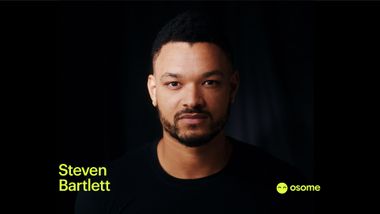Five Key Takeaways From Steven Bartlett’s Revenue Masterclass
Osome was honored to host Steven Bartlett for a special masterclass on building a business. The masterclass was wide-ranging, taking in Steven’s past, his entrepreneurial insights, regrets and lessons.

Osome had the privilege of hosting Steven Bartlett for a special masterclass on building a business. You’ve likely seen Steven around or you may have heard him on his chart-topping podcast Diary of a CEO.
Steven’s story is a remarkable one. From a small uni bedroom in Manchester, an 18-year-old Bartlett formed a company called Social Chain. With social media still in its infancy, Bartlett’s social media agency was an early bet that paid off in a big way.
Social Chain is now a nine-figure turnover, publicly listed company. Steven is still a shareholder but is no longer the CEO. Instead, his focus has moved to other ventures, including being an investor on Dragon’s Den.
The masterclass was wide-ranging, taking in Steven’s past, his entrepreneurial insights, regrets and lessons. You can watch the full video on YouTube, but we’ve compressed a few of the key takeaways below.
Building a Personal Brand
Like so many entrepreneurs, Steven worked long hours (and still does). When Social Chain was in its infancy and his personal branding efforts were yet to pay off, work often continued until the early morning.
In the Masterclass, Steven recalled working until late at night and then filming videos until the early hours. Building his personal brand was a top business priority.
As a young man (Bartlett is only 29), the question is often asked of him: Was it a sacrifice to work these long hours and give up the parties and lad’s holidays? “On balance, was it a sacrifice I made? I made a choice. I decided that something else would make me more fulfilled.”
Cheap Regrets
“Hindsight is a wonderful thing,” Steven says. “It illuminates the places where you wasted time or made bad decisions. In hindsight, I can look back at things and ask ‘what if I had more self-belief?’
“But dwelling too much on regret risks removing the lesson. I have to be grateful for where I am.”
Every entrepreneurial journey will be filled with shortcomings and setbacks. Indeed, in the masterclass, Steven spoke frankly about moments of “loneliness and sadness” and “difficulty and anxiety”.
Indeed, there were failures along the way. Social Chain was a pivot. Its previous iteration had been a failure, so Steven changed tack. His first big success came from a humbling failure.
These moments, however, were when his success was forged. At the time, these things seem fatal – but years later, you can see them in perspective. “In those crisis situations, it was through optimism, focus, hard work, and belief that I overcame the problem.”
Cover Your Weak Spots With Good Hires
Like many entrepreneurs, Steven admits to not enjoying the operational aspects of business. “I don’t really get involved in financial accounting,” he said. This facet of your business is, obviously, rather essential.
His solution is to “ensure that the blindspot is covered by someone I can trust”. A good accountant will do the trick. And by limiting the amount of time he’s exposed to things he doesn’t enjoy, Steven deploys his energy more effectively.
Cash Crunches Affect Everyone
A cash flow crisis can affect all businesses. Social Chain was turning over millions per month and yet still faced periodic cash crunches. Steven cautions against conflating what you invoice with what you have in your bank account.
“In a month, you could be invoicing for three million. But in the bank, you might have only a million. And you’ll have outgoings like perhaps you’ll have a major campaign with a brand where you need to put cash down up front.
“If you grow too quickly, no matter how much money you’re bringing in, you can experience a cash crunch. You’re paying costs before you get paid. You can have a cash crunch if you’re turning over £100m.”
Growth needs to be sustainable and, as Steven notes, he learned this the hard way.
It’s You vs. You
As someone who made his success on social media, Bartlett is extremely cautious about how these platforms push us to compare ourselves to others. In his career, especially in the early days, he found himself watching others.
Over the years, he has shifted his focus internally. “The most realistic, worthy comparison I can make is how am I performing today versus yesterday. How have I developed my skillset this year versus last year? How am I speaking and selling? How am I treating people?
“These are the metric I use in my professional and personal life.” Push yourself, definitely, but keep the focus on improvement. Not eclipsing real or imagined competitors.
Tip
An easy way to level up your business is with advisory and accounting expertise. Seek out accountants geared towards entrepreneurs. If you’re on the same wavelength, the value will increase exponentially.







